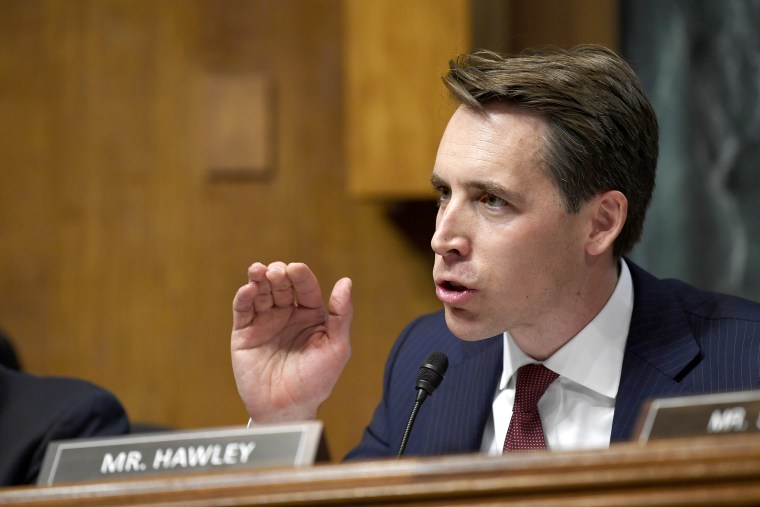Sen. Josh Hawley, R-Mo., on Wednesday took another shot at Silicon Valley with proposed legislation that would remove protections large online platforms receive under U.S. law.
Hawley's bill would change Section 230 of the Communications Decency Act of 1996, which provides immunity for big tech platforms like Facebook, YouTube and Twitter from liability for content posted by its users.
Under his legislation, titled the Ending Support for Internet Censorship Act, companies would have to earn immunity by submitting to Federal Trade Commission audits that prove their algorithms and content-removal practices are "politically neutral."
The change would apply only to companies with more than 30 million active monthly users in the U.S., more than 300 million active monthly users worldwide or more than $500 million in global annual revenue.
"These tech companies, I mean they exist in a way they are because of Section 230, which is a very special carve out that nobody else in their space, no other media account as you all know, no other media companies no other publishers, nobody gets this special treatment that they do," Hawley said in an interview with NBC News last month. "That section was supposed to be a pro-competition, pro-innovation and frankly pro-speech provision."
The legislation comes as Hawley, like many Republicans, have taken issue with recent moves by those tech platforms to suspend or ban some users and organizations for spreading hate speech or participating in targeted harassment. Many of these instances have prompted a backlash on the right, claiming that the platforms are anti-free speech and simply trying to stifle viewpoints they disagree with.
"I mean the answer is just pretty simple: Just don't do that," Hawley told NBC News. "You don't have to promote any particular side but don't engage in viewpoint discrimination, and if they're going to, then they should be treated like a normal publisher."
It would be up to the FTC to determine what constitutes political neutrality, and big tech companies would not be able to receive immunity unless a supermajority of FTC commissioners — which would require a bipartisan vote — decide that they are acting neutrally.
Critics of Hawley's ideas say that if those Section 230 protections for digital platforms change, the internet "would probably be decimated overnight" and that changes to the law could create the opposite effect, causing platforms to purge many more users. But the idea of changing the Section 230 protections has been pondered by both Republicans and Democrats in recent years.
"Senator Hawley has written a bill to deputize the federal government as the Speech Police in flagrant violation of the First Amendment," Sen. Ron Wyden, D-Ore., said in a statement. "This bill would essentially force every platform to become 4chan or 8chan rather than maintain some basic level of decency."
Wyden, the ranking member of the Senate Finance Committee, added that it appeared to him that Hawley's staff hadn't "even read the statute he's trying to change."
"The old Republican party fought tooth and nail for this sort of protection, but the party of Donald Trump clearly believes that lawyers and bureaucrats should tell private companies how to make clearly private business decisions," he said. "The drive by Republicans to eliminate the autonomy of large private firms is extremely disturbing."
While other lawmakers did not immediately come out in support of Hawley's legislation, President Donald Trump's eldest son, Donald Trump Jr., promoted the bill on his Twitter feed.
If the bill were to be enacted, companies like Facebook and Twitter could be forced to review every piece of user content before it's posted.
Groups such as Americans for Prosperity, a libertarian policy group, and the Internet Association, a lobbying group of which Google and Facebook are members, criticized Hawley's proposal.
“This bill forces platforms to make an impossible choice: either host reprehensible, but First Amendment protected speech, or lose legal protections that allow them to moderate illegal content like human trafficking and violent extremism," Michael Beckerman, president and CEO of the Internet Association, said. "That shouldn’t be a trade-off."

